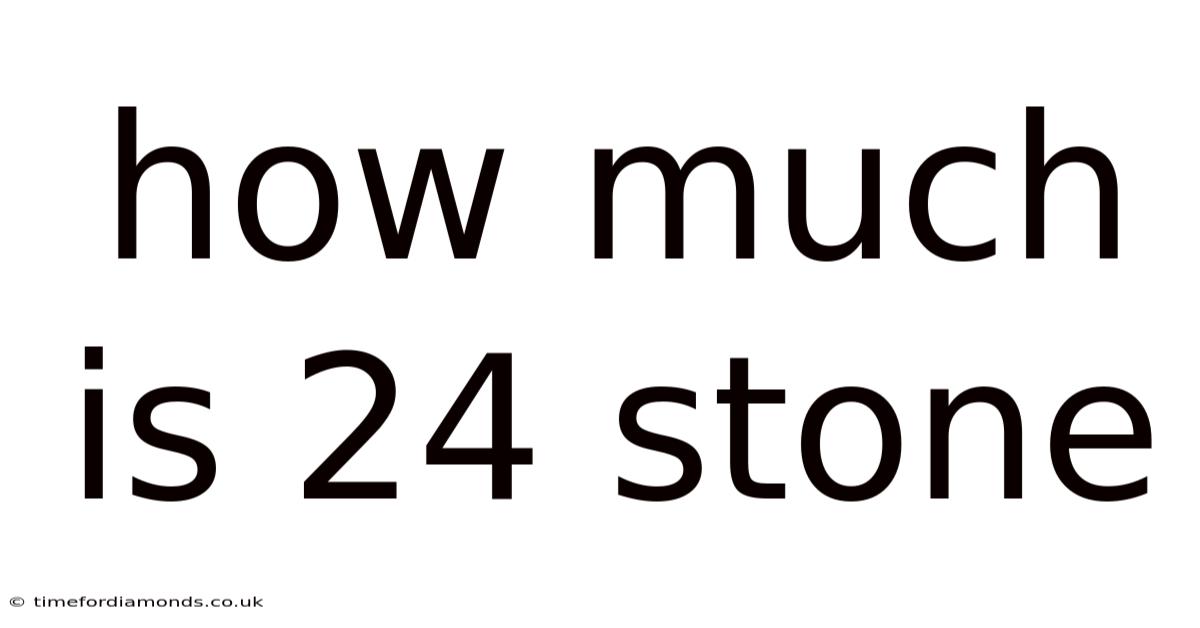How Much Is 24 Stone
timefordiamonds
Sep 11, 2025 · 4 min read

Table of Contents
How Much is 24 Stone? A Comprehensive Guide to Weight Conversion and Understanding Imperial Units
Understanding different weight systems can be confusing, especially when dealing with less common units like stones. This comprehensive guide will delve into the question: how much is 24 stone? We'll explore the conversion from stones to more widely used units like pounds and kilograms, discuss the history of the stone unit, and provide practical examples to solidify your understanding. By the end, you’ll be confident in converting weights and navigating the world of imperial measurements.
Introduction: Understanding Stones and Imperial Units
The stone is a unit of weight primarily used in the United Kingdom and some other Commonwealth countries. It's part of the imperial system, a system of measurement that contrasts with the metric system (kilograms, grams, etc.). While the metric system is more widely adopted globally, understanding the imperial system, including the stone, remains important, especially for historical context and in certain regions. This article will clarify the relationship between stones, pounds, and kilograms to answer the key question: how much is 24 stone?
How Much is 24 Stone in Pounds?
The fundamental relationship to remember is that one stone is equal to 14 pounds. Therefore, to find out how much 24 stone is in pounds, we simply multiply:
24 stones * 14 pounds/stone = 336 pounds
Therefore, 24 stone is equal to 336 pounds. This is a significant weight, equivalent to a very large adult or several smaller adults.
How Much is 24 Stone in Kilograms?
The conversion to kilograms requires an additional step. We know that one pound is approximately equal to 0.453592 kilograms. Starting with our 336 pounds:
336 pounds * 0.453592 kilograms/pound ≈ 152.58 kilograms
Therefore, 24 stone is approximately equal to 152.58 kilograms. This is a more internationally understandable figure, showing the substantial weight represented by 24 stones.
A Deeper Dive into the History of the Stone Unit
The origin of the stone as a unit of weight is rooted in ancient trade practices. While the exact origins are debated, the concept of using stones as a weight measurement likely stems from the readily available and relatively consistent weight of natural stones. Over time, these stones were standardized, leading to the current definition of 14 pounds.
The use of stones persists in some contexts even with the wider adoption of the metric system. It’s still commonly used when discussing weight in certain industries (like livestock or horse racing), and many people find it a familiar and convenient measure within their cultural context. The persistence of the stone shows the powerful influence of historical measurement systems.
Practical Examples and Applications
Understanding the weight of 24 stone becomes more concrete when we consider real-world scenarios:
- Livestock: 24 stone could represent the weight of a large animal like a sizable bull or several sheep.
- Heavy machinery: Parts of heavy machinery could weigh close to this amount.
- Historical contexts: Examining historical records involving weights, especially those concerning trade or agriculture, would frequently employ stones.
Frequently Asked Questions (FAQ)
Q1: Why is the stone still used if the metric system is preferred internationally?
A1: Habit, cultural familiarity, and specialized contexts contribute to the continued use of stones. While the metric system is internationally recognized, some sectors still find the stone a convenient measure due to long-standing tradition.
Q2: Are there different types of "stones" in terms of weight?
A2: While regional variations might have existed historically, the standard definition of a stone remains 14 pounds. Any variations would be considered archaic or localized exceptions.
Q3: How can I easily convert stones to pounds and kilograms myself?
A3: Use the following formulas:
- Stones to pounds: Stones * 14 = Pounds
- Pounds to kilograms: Pounds * 0.453592 = Kilograms
- Stones to kilograms: Stones * 14 * 0.453592 = Kilograms
You can use a calculator or online converter for quick and accurate calculations.
Q4: Is there a simple way to remember the conversion factor?
A4: Yes! Think of "14" as the magic number. One stone is 14 pounds, and that’s the key to unlocking the rest of the conversions.
Q5: What are some alternative units for measuring weight?
A5: Other units include ounces, tons (both short and long tons), and the metric units of grams and milligrams, all with differing values and scales.
Conclusion: Mastering Weight Conversions
Understanding weight conversions, particularly between imperial and metric systems, is crucial for navigating different contexts. We've thoroughly answered the question, "How much is 24 stone?" demonstrating that 24 stone is equivalent to 336 pounds or approximately 152.58 kilograms. Remember the fundamental conversion of 1 stone to 14 pounds as the cornerstone for future calculations. Whether you’re dealing with historical records, livestock weights, or any other application, this knowledge empowers you to accurately interpret and convert weights, facilitating better understanding and communication. Now you can confidently move between different weight systems and feel empowered to tackle similar conversions with ease. The key is to remember the fundamental conversion factor and to utilize simple multiplication to convert between units. This understanding extends beyond a simple answer and allows you to engage with a wider understanding of weight measurement systems and their historical context.
Latest Posts
Latest Posts
-
2 000 Meters To Miles
Sep 11, 2025
-
Convertidor De Oz A Gramos
Sep 11, 2025
-
What Is 17kg In Pounds
Sep 11, 2025
-
One And A Quarter Inch
Sep 11, 2025
-
Convert 37 F To C
Sep 11, 2025
Related Post
Thank you for visiting our website which covers about How Much Is 24 Stone . We hope the information provided has been useful to you. Feel free to contact us if you have any questions or need further assistance. See you next time and don't miss to bookmark.